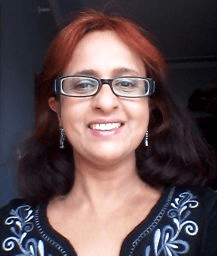India Center Fellow Delivers Talk On Role of Women In Combat

BY SEEMA SHEKHAWAT, India Center Fellow
On September 17, 2019, I delivered a talk at UCF’s Learning Institute for Elders (LIFE), on “Female Combatants: Victim or Victimizers.” It was an exciting experience speaking on a topic close to my heart in front of about 400 people.
I have been researching these relatively less focused issues of gender and conflict and their intersection over the last 10 years. My book Gender, Conflict and Peace in Kashmir (Cambridge University Press, 2014) focused on varied experiences of women in conflict, including as perpetrators.
My edited volume Female Combatants in Conflict and Peace: Challenging Gender in Violence and Post-Conflict Reintegration (Palgrave, 2015) focused on select case studies of women’s involvement in conflicts across the globe. My talk at LIFE drew from these publications and from my recent field visits to South Asia.
Focusing on women in non-state armed groups, I presented a comprehensive picture of life experiences, sociocultural and political constructions of gender and everyday realities of struggle and survival of women fighters in combat groups in South Asia. I argued that women experience state-group conflicts in multiple overlapping ways: victims, survivors, resistors, peacebuilders and perpetrators. Drawing from extensive field research in the hinterlands of India and Nepal, I examined the factors behind the women’s participation in violence, their experiences of gender (in)equality within the group, and their location in the post-conflict context.
Drawing on the cultural and historical traditions of India I elaborated how Goddesses Durga and Kali are revered as they slay the evil.
During the Indian Independence movement women were involved in direct combat and support roles. For example, Queen of Jhansi, Laxmi Bai, tying her infant son on her back, fought the British army.
I argued that the reasons for women to enlist as combatants include economic, ideology, revenge, coercion and patriarchy. Women may enjoy some freedom through breakdown of traditions, destruction of social structures that degrade women.
Women do not necessarily become immune to exploitation even after they become agents of violence. My research findings support this argument. First, there is no acknowledgement of women’s role in a rebel movement. Second, equality/empowerment is not realized through enlisting women in combat movements; relatedly, gender-based violence remains a reality for female combatants during as well as after conflict. Third, these women are not accorded due place in peace process. The masculine leadership justify their exclusion on flimsy grounds.
I concluded that female combatants confront violence, exploitation, discrimination even while being perpetrators. The question remains: should these women be called victims or victimizers?
